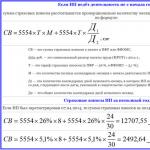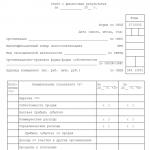Surely you have more than once had to retell the words of another person in a conversation. How did that make you feel?
At first, most likely, you are not very confident, because you need to take into account many factors: change the order of words in a sentence or not, whether to use other tense forms, or maybe not, whether to choose other words, etc.
How can one correctly translate direct speech in a sentence into indirect speech or correctly convey someone else’s words? Let's find out!
About direct and indirect speech in English
« Direct speech" or direct speech- these are the words of a person, transmitted literally as they were spoken. In writing, direct speech is highlighted in quotation marks, and a comma is placed after words introducing direct speech.
She says, "The lessons begin at 9 o'clock." - She says: “Classes start at 9 o’clock.”
« Indirect speech"("reported speech") or indirect speech- this is speech that is not conveyed word for word, but only in content, in the form of additional subordinate clauses. In this case, the comma separating the speaker’s words from direct speech and the quotation marks in which direct speech is taken are omitted.
She says that the lessons begin at 9 o’clock.- She says that classes start at 9 o’clock.
In direct speech, a person usually speaks in the first person. But in indirect speech we cannot speak on behalf of this person. So we change "I" to the third person.
She said, "I will buy a dress."- She said: “I’ll buy a dress.”
She said that she would buy a dress.- She said she would buy a dress.
Exceptions to the rules
As you know, any rule has its exceptions. So it is in indirect speech. These exceptions are not many, but they are worth knowing. So, the rule for coordinating times is not observed:
- IN subordinate clauses, which express well known fact or the truth.
Didn't say that 22 December is the shortest day of the year.
He said that December 22 is the shortest day of the year.
- When in a subordinate clause there is modal verbs « must», « should», « ought to»:
I said that I must meet her.- I said that I need to meet her.
- If the speaker refers to words that have just been spoken:
Kate: "Stay with me, Mark. I will cook something delicious."- Kate: Stay with me, Mark. I'll cook something delicious.
Mark to Elza: "Kate said she will cook something delicious."- Mark Else: Kate said she would cook something delicious.

- In subordinate clauses introduced by conjunctions when/since, where is the simple past tense ( Past Simple) doesn't change its form:
I answered that I hadn’t met her since we moved.“I replied that I hadn’t seen her since we moved.”
- If the speaker used tenses Past Continuous, Past Perfect, then they do not change in indirect speech, regardless of the tense of the verb that introduces indirect speech:
"I was working at 6 o"clock." - He said that he was working at 6 o"clock.(if the offer specifies the exact time of validity)
"I had never seen such a big fish before my visit to an aquarium." - She said that she had never seen such a big fish before her visit to an aquarium.
Questions in indirect speech
In indirect speech, questions have direct word order, and the question mark at the end of the sentence is replaced by a period.
General issues are introduced by conjunctions " if" or" whether»:
I asked, "Have you seen my pen?"- I asked: “Have you seen my pen?”
I asked him whether/if he had seen my pen.- I asked if he saw my pen.
Special questions are introduced with question words:
He wondered: “Who on earth would buy this junk?!”- He asked: “Who would even buy this junk?!”
He didn't wonder who on earth would buy that junk.- He asked who would even buy this junk.
A short answer to the question of indirect speech is introduced by the conjunction “ that" without words " yes»/« no»:
She answered, "Yes, I do."- She answered: “Yes.”
She answered that she did.- She answered in the affirmative.
Imperative sentences in indirect speech
Such sentences are used with verbs " say», « tell», « order», « ask», « beg", and the verb is in the imperative mood changes to infinitive form:
Mom told me, "Clean your room."- Mom told me: “Clean up your room.”
Mom told me to clean my room.- Mom told me to clean my room.
The negative form of the verb in the imperative mood is replaced infinitive With preceding particle not.
He said, "Don't run in the corridor."- He said: “Don’t run in the corridor.”
He said not to run in the corridor.- He said not to run in the corridor.
There are many options for conveying indirect speech. In the table we have collected some verbs - “ introduction verbs”, which will help you convey someone else’s speech without constantly using “she said” or “he asked”:
| Introductory Verb | Translation | Direct Speech | Reported Speech |
| agree | agree | “Ok, I was wrong.” | He agreed that he had been wrong. |
| claim | declare | “I saw the UFO.” | He claimed that he had seen the UFO. |
| complain | complain | “You never share any secrets with me!” | She complained that I never share any secrets with her. |
| admit | to acknowledge | “I was really unfriendly to him.” | She admitted that she had been unfriendly to him. |
| deny | deny | “I didn’t break your favorite cup!” | He denied that he had broken the cup. |
| exclaim | exclaim | “I am so happy!” | She exclaimed that she was very happy. |
| explain | explain | “You see, there’s no point in going there right now.” | He explained that there was no point in going there at that very moment. |
| recommend | advise | “You'd better stay at home.” | She recommended that we stayed at home. |
| prove | prove | “See, the system works.” | He proved that the system worked. |
| insist | insist | “You do need to be present at the meeting.” | They insisted that I need to be present at the meeting. |
| regret | regret | “If only I could go on a vacation this year.” | She regrets that she can’t go on a vacation this year. |
| state | approve | “I have never seen the young man before.” | The witnessed that she had never seen the young man before. |
| promise | promise | “I will be back no later than eight o’clock.” | Dad promised that he will be back no later than eight o’clock. |
| suggest | suggest | “Shall we spend the evening together?” | He suggested that they spent the evening together. |
| assert | approve | “Nuclear power is a safe and non-polluting kind of energy.” | The scientists asserted that nuclear power is a safe and non-polluting kind of energy. |
| contend | declare | “The Earth may be much younger than previously thought.” | Some astronomers contend that the Earth may be much younger than previously thought. |

Conclusion
Indirect speech and tense agreement are quite difficult topics that need to be practiced. You can, for example, retell an episode from a TV series or convey your conversations with friends in English. When practicing doing this, do not forget about synonyms for the words “say” and “ask” so that your retelling is not monotonous.
Big and friendly EnglishDom family
To retell someone's words, we need to use indirect speech, and it has its own rules for the use of tenses and some important words. Many of these rules can be understood intuitively, but some still need to be remembered. We will learn how to convey statements in indirect speech in this lesson.
Topic: Indirect speech. [i]Reported Speech
Lesson: Reported speech and reported statements
Direct speech- these are the exact words that were spoken by someone. We put direct speech in quotation marks.
‘I’ll go to London’, she said.
Indirect speech conveys the exact meaning of what was said, but not in exactly the same words.
She said she would go to London.
Verbs can be used to indicate who is speaking say And tell both in direct and indirect speech. It is important to note that after the verb tell there must be a direct object (e.g. told me). After the verb say You don’t have to put a direct object, but if we do put it, then after say in this case there will be the particle to (e.g. said to me).
She said, ‘I can’t drive’. →She said(that) she couldn’t drive.
She said to me, ‘I can’t drive’. →She said to me(that) she couldn’t drive.
She told me, ‘I can’t drive’. →She told me(that) she couldn’t drive.
The following expressions are used with the verb say:
1. say good morning / evening, etc.
2. say something / nothing
3. say a few words
The following expressions are used with the verb tell:
1. tell the truth
3. tell somebody one’s name
5. tell a secret
6. tell somebody the way
7. tell one from another, etc.
To construct a sentence in indirect speech, we need introductory verb(say, tell, explain, etc.), followed by a turn with that, although in colloquial speech the word that itself is often omitted.
He said, ‘I feel sick’. → He said (that) he felt sick.
Possessive pronouns change according to context.
He said, 'I'll lend youmy laptop'. → He said (that) he would lend mehis laptop
Consider the table of changes for tense adverbs and some words:
|
Direct speech |
Reported speech |
|
tonight, today, this week / month / year |
that night, that day, that week / month / year |
|
then, at that time, at once, immediately |
|
|
yesterday, last night / week / month / year |
the day before, the previous night / week / month / year |
|
tomorrow, next week / month / year |
the following day / the day after, the following / next week / month / year |
Table 1. Circumstances of time in indirect speech
When the introductory verb is in the past tense, the tenses of the main clause change according to the rule.
Consider the table of changing times:
|
Direct speech |
Reported speech |
|
Present Continuous |
|
|
Present Perfect Continuous |
Past Perfect Continuous |
|
Past Continuous or Past Perfect Continuous |
|
|
Future-in-the Past (would) |
|
|
remains the same |
Table 2. Tenses in indirect speech
We do not make any changes to tenses when:
1. the main sentence always expresses the truth, the law of nature;
2. the main sentence belongs to type 2 or 3 of conditional sentences;
3. the main sentence expresses regret or wish (wish).
'The Earth is a planet’, he said. → He said (that) the Earth is a planet.
'If you studied more, you' d pass your test’, he said. → He said (that) if you studied more, you' d pass your test.
‘I wish I were famous’, he said. → He said (that) I wish I were famous
If the introductory verb is in one of the tenses of the Present or Future group, no changes in tenses occur in the main sentence.
‘Nina can read’, she says. → She says that Nina can read.
When we are talking about a fact that is still relevant or true at the present moment, we may or may not change the grammatical tenses of the main clause when translating it into indirect speech.
Grammatical tenses change when we talk about something that is no longer relevant or incorrect at the time of speech.
'I' m travelling to England next week’, he said.→He said (that) he is traveling / was traveling to England next week.
(up-to-date reporting - immediately reported after being said)
'I' m travelling to England in January’, he said. (Now it's February) →He said he was traveling to England in January. (The trip is over since it’s February. Out-of-date reporting)
'The Earth is flat’, he said. → He said the Earth was flat. (It's not true.)
Practical tasks
Rephrase the following sentences as in the example:
1. We spoke quietly because we didn’t want to wake the baby.
e.g. We spoke quietly so as not to wake the baby.
2. Although he was ill, he still went to work.
3. What a lovely house!
4. How happy you look!
5. This is the university I went to.
6. You run so fast!
7. She has such lovely eyes!
8. What a beautiful dress!
9. Despite being tired, she still watched the late film!
10. I didn’t tell you because I thought you’d be upset.
- Afanasyeva O.V., Dooley D., Mikheeva I.V. English language (basic level). - Enlightenment, 2012.
- Biboletova M.Z., Babushis E.E., Snezhko N.D. English language (basic level). - Title, 2009.
- Kaufman K.I., Kaufman M.Yu. English language (basic level). - Title, 2010.
- Golitsynsky Yu.B., Grammar. Collection of exercises. - Karo, 2011.
- Ego4u.com ().
- Engmaster.ru ().
- English on-line ().
- ex. 311, 313. Golitsynsky Yu.B., Grammar. Collection of exercises. - Karo, 2011.
- Change the following into indirect speech:
1. "I have something to tell you," I said to her.
2. "I met her for the first time on a warm sunny morning last spring," he said.
3. "I am going to call again tomorrow, mother," she said.
4. "I"ve been to Turkey twice, but so far I haven"t had time to visit Istanbul," said Robert.
5. "It will be very difficult to persuade her to take care of herself, doctor," I replied.
6. "The president is to come to Madrid the day after tomorrow," said the BBC announcer.
7. "We have a lift but very often it doesn't work," they said.
8. "We have bought a new flat. But we don"t like it so much as our last one," said my cousin.
9. "I have left a message for him, but he hasn't phoned yet," she said.
10. "I"ve no idea who has done it but I"ll find out," said Peggy.
11. He said, "My mother has just been operated on."
12. "I"ll come with you as soon as Fin is ready," she replied to me.
13. I have a French lesson this evening and I haven"t done my homework yet," said the little boy.
14. "She has been sitting in the garden since the police came," I said to the officer.
15. “You haven’t closed the window and has forgotten to turn off the light,” he pointed out.
- ex. 317 Golitsynsky Yu.B., Grammar. Collection of exercises, Karo, 2011
Direct speech in English ( Direct Speech), literally quoting a statement. The response is enclosed in quotation marks on both sides, and you add the words of the author to it, e.g. He says: “I swim well”.
Indirect speech in English ( Reported Speech/ Indirect Speech), conveying the content of the conversation from a third person. In this case, the accuracy of the statement is violated: you change the tense forms and word order in the sentence.
let's consider Reported Speech rule and we will learn how to correctly express the opinion of the interlocutor without lying anything.
Indirect speech in English always depends on what tense is used in the author's words. If it’s real, then you can breathe out and relax: you won’t have to change almost anything. The tense in the subordinate clause will remain the same, just watch the verb form and capricious pronouns:
Melissa says: “I am a good cook.” – Melissa says thatshe is a good cook.
Jack said:"Ilike cats.”(Present Simple) – Jack said that heliked cats.(Past Simple)
We will look at time coordination in more detail ( Sequence of Tenses) separately.
Examine the Reported Speech table. With it you will be able to express yourself grammatically correctly. And one more piece of advice - always try translate sentences into Russian, it will tell you which words will have to be replaced.
|
Direct Speech |
Reported Speech |
|
Affirmative sentences turn into complex sentences with the conjunction That (that). Please note whether it is known who we are addressing. If yes, then the verb to say needs to be changed to to tell. |
|
|
They say: "Annie, we read a lot of books." |
They tell Annie that they read a lot of books. |
|
When you translate negative sentences into indirect speech in English, pay special attention to the form of the verb and do not lose the not particle. |
|
|
Mark says: “I don’t like computer games.” |
Mark says that he doesn’t like computer games. |
|
Imperative sentences, namely orders and requests, become infinitives. In this case, in the main sentence, use the verbs to ask - to ask, to tell - to say, command, to order - to order, etc. and indicate the person to whom you are addressing. |
|
|
Mother said: “Open the window.” |
Mother asked me to open the window. |
|
Questions become subordinate clauses with direct word order. a) General questions are introduced by subordinate clauses using the conjunctions if and whether |
|
|
Jim asks me: “Do you watch TV?” |
Jim asks me if I watch TV. |
|
b) Special questions are attached to the main sentence with the interrogative words that are used in them. |
|
|
Tony wonders: “What is your favorite food?” |
Tony wonders what my favorite food is. |
If the sentence you are translating into indirect speech in English has demonstrative pronouns or adverbs of time and place, then our table will help to replace them correctly:
|
Direct Speech |
Reported Speech |
|
This - this |
That - that |
|
Here - here |
There - there |
|
Now - now |
Then - then |
|
Today - today |
That day - on that day |
|
Tomorrow - tomorrow |
The next day - the next day |
|
Yesterday - yesterday |
The day before - the day before |
|
The day after tomorrow - the day after tomorrow |
Two days later - two days later |
|
The day before yesterday - the day before yesterday |
Two days before - two days before |
|
Ago - ago |
Before - before |
|
Next month - next month |
The next month, the following month – a month later |
|
Last week - last week |
The previous week - the week before |
Sentences with direct speech do not pose any difficulty. We simply translate them using the tenses we see fit.
For example:
Cinderella said: "I will marry this prince."
Cinderella said: “I will marry this prince.”
The director said: “Yesterday you did a very good job.”
Director said: “Yesterday you worked very well.”
The writer says: “I write a new book every year.”
A writer says: “I write a new book every year.”
There's really nothing complicated about it.
It's a little more complicated with sentences in which we convey other people's words. Here, first of all, you need to pay attention to the words of the author, like "She says", "He asked", "The director will tell" and so on. If these words are in the present tense ( "she says"- now or usually), then when changing direct speech into indirect speech, we do not change the tense.
For example:
Mom often says that we are not very attentive.
Mother often says that we are not very careful.
The doctor says that at this time of year many people get sick.
Doctor says that many people get ill in this season.
She says he hasn't called her yet.
She says that he hasn’t called her yet.
But it is possible that the words that we want to convey using indirect speech were said before. And the author’s words refer to the past ( "we said", "they asked", "He adviced" and so on.).
For example:
The store clerk said yesterday: “This bread is fresh.”
The seller said yesterday that this bread is fresh.
The teacher said last week: “Tomorrow we will write a test.”
The teacher said last week that tomorrow we will write a test.
And in this case "in Game" enters TIME CONSISTENCY RULE.
Since information about fresh bread and test work has been given in the past, there is a need to slightly change the tenses in the part that reads from the word "WHAT".
For example, if in a sentence with direct speech time was used Present Simple, then, having converted the sentence into indirect speech, we will use Past Simple.
He said: " I LIKE to read newspapers in the morning.” – He said that he LIKED to read newspapers in the morning.*
*Please note that when you change a sentence to indirect speech, the subject changes! He says:"I'm coming." - He says he's coming.
The entire sequence of changing times according to this principle is given in the table below:
Sequence of Tenses
|
TIME IN A SENTENCE WITH DIRECT SPEECH |
TIME IN A SENTENCE WITH INDIRECT SPEECH |
|
Present Continuous |
Past Continuous |
|
Present Perfect |
|
|
Past Continuous |
Past Perfect Continuous |
|
All Future tenses |
All Future-in the Past tenses* |
* Future-in the Past tenses are formed using an auxiliary verb "WOULD", which we simply use instead of the auxiliary verb "will".
For example, “will go” (Future Simple) – “would go” (Future Simple – in the Past).
(What People Say or Tell You to Do)
Reported Statements.
Look at this sentence: "I'm painting the house," said John.
Now look at this sentence and notice the changes: Charles spoke to Alan. John said he was painting the house.
When Charles reported to Alan what John said, the pronoun I became he and am(present) became (past).
We sometimes put that after said, but it isn't necessary: "John said (that) he was painting the house."
Verb changes.
- When we report what someone has said, we usually make the following verb changes:
- Present Simple to Past Simple.
"I come here every week." - She said she came here every week. - Present Continuous to Past Continuous.
"I"m painting the house." - He said he was painting the house. - Past Simple or Present Perfect to Past Perfect (see Note below).
"I bought some new chairs in the sale." - She said she had bought some new chairs in the sale.
"I"ve seen that film twice." - He said he had seen that film twice. - Am /is /are going to become was/were going to.
"We"re going to meet in Paris." - She said they were going to meet in Paris. - Will becomes would.
"I"ll come early." - He said he would come early. - Can becomes could.
"I can do all the exercises." - She said she could do all the exercises.
Note:
We only use the Past Perfect on special occasions, such as here with reported statements and also with reported questions. It is formed with the Simple Past of have (had) + Past Participle: Simple Past - I went, Past Perfect - I had gone.
Pronoun changes.
- We also make changes with the pronouns, but this depends on who the reporting speaker is.
- I told Peter I liked playing netball. Here the pronoun I remains the same, because the reporting speaker is Joan - the same speaker.
- Joan told Peter she liked playing netball. Here we change the pronoun I to she, because there is a different reporting speaker.
"I like playing netball, Peter", Joan said.
Note:
Be careful with the pronoun change!
Reporting verbs: say and tell.
- We can use tell instead of say, but when we use tell, we want to know who the speaker told.
David told me he was painting the house.
Mary told Frank she could do all the exercises.
Note:
We always tell someone something. - We use tell + the infinitive form to report orders.
"Close the door, please, John." - He told John to close the door.
When it is negative, we put not before the infinitive.
"Don"t run so fast, Kate." - She told Kate not to run so fast.
Indirect speech.
In English, when translating sentences from direct speech to indirect speech, it is necessary to change the grammatical tense of the predicate according to the table below. This rule only works if the author’s words in direct speech are in the past tense.
| Present Simple Present Continuous | Past Simple Past Continuous |
| Present Perfect Past Simple | Past Perfect |
| Future | Future-in-the-past |
When translating sentences into indirect speech, do not forget to replace the tense adverbials as indicated in the table.
| Direct speech | Reported Speech |
| today | that day |
| yesterday | the day before |
| tomorrow | the next day |
| ...ago | ...before |
| this | that |
| these | those |
| here | there |
| last year | the year before |
| last month | the month before |
| last | the...before |
| next | the following... |
Note:
Remember to change pronouns, for example: "Joan told Peter she liked playing netball," said Mike.
Here we have replaced the pronoun I on she, because the author of indirect speech does not coincide with the subject of direct speech.
To retell someone's words, we need to use indirect speech, and it has its own rules for the use of tenses and some important words. Many of these rules can be understood intuitively, but some still need to be remembered. We will learn how to convey statements in indirect speech in this lesson.
Topic: Indirect speech. [i]Reported Speech
Lesson: Reported speech and reported statements
1. The concept of direct and indirect speech
Direct speech- these are the exact words that were spoken by someone. We put direct speech in quotation marks.
‘I’ll go to London’, she said.
Indirect speech conveys the exact meaning of what was said, but not in exactly the same words.
She said she would go to London.
2. Introductory verbs in direct and indirect speech
Verbs can be used to indicate who is speaking say And tell both in direct and indirect speech. It is important to note that after the verb tell there must be a direct object (e.g. told me). After the verb say You don’t have to put a direct object, but if we do put it, then after say in this case there will be a particle to (e.g. said to me).
She said, ‘I can’t drive’. →She said(that) she couldn’t drive.
She said to me, ‘I can’t drive’. →She said to me(that) she couldn’t drive.
She told me, ‘I can’t drive’. →She told me(that) she couldn’t drive.
The following expressions are used with the verb say:
1. say good morning / evening, etc.
2. say something / nothing
3. say a few words
The following expressions are used with the verb tell:
1. tell the truth
3. tell somebody one’s name
5. tell a secret
6. tell somebody the way
7. tell one from another, etc.
3. Rules for constructing indirect speech
To construct a sentence in indirect speech, we need introductory verb(say, tell, explain, etc.), followed by a turn with that, although in colloquial speech the word that itself is often omitted.
He said, ‘I feel sick’. → He said (that) he felt sick.
Possessive pronouns change according to context.
He said, 'I'll lend youmy laptop'. → He said (that) he would lend mehis laptop
Consider the table of changes for tense adverbs and some words:
|
Direct speech |
Reported speech |
|
tonight, today, this week / month / year |
that night, that day, that week / month / year |
|
then, at that time, at once, immediately |
|
|
yesterday, last night / week / month / year |
the day before, the previous night / week / month / year |
|
tomorrow, next week / month / year |
the following day / the day after, the following / next week / month / year |
Table 1. Circumstances of time in indirect speech
When the introductory verb is in the past tense, the tenses of the main clause change according to the rule.
Consider the table of changing times:
|
Direct speech |
Reported speech |
|
Present Continuous |
|
|
Present Perfect Continuous |
Past Perfect Continuous |
|
Past Continuous or Past Perfect Continuous |
|
|
Future-in-the Past (would) |
|
|
remains the same |
Table 2. Tenses in indirect speech
We do not make any changes to tenses when:
1. the main sentence always expresses the truth, the law of nature;
2. the main sentence belongs to type 2 or 3 of conditional sentences;
3. the main sentence expresses regret or wish (wish).
'The Earth is a planet’, he said. → He said (that) the Earth is a planet.
'If you studied more, you' d pass your test’, he said. → He said (that) if you studied more, you' d pass your test.
‘I wish I were famous’, he said. → He said (that) I wish I were famous
If the introductory verb is in one of the tenses of the Present or Future group, no changes in tenses occur in the main sentence.
‘Nina can read’, she says. → She says that Nina can read.
When we are talking about a fact that is still relevant or true at the present moment, we may or may not change the grammatical tenses of the main clause when translating it into indirect speech.
Grammatical tenses change when we talk about something that is no longer relevant or incorrect at the time of speech.
'I' m travelling to England next week’, he said.→He said (that) he is traveling / was traveling to England next week.
(up-to-date reporting - immediately reported after being said)
'I' m travelling to England in Jan




















